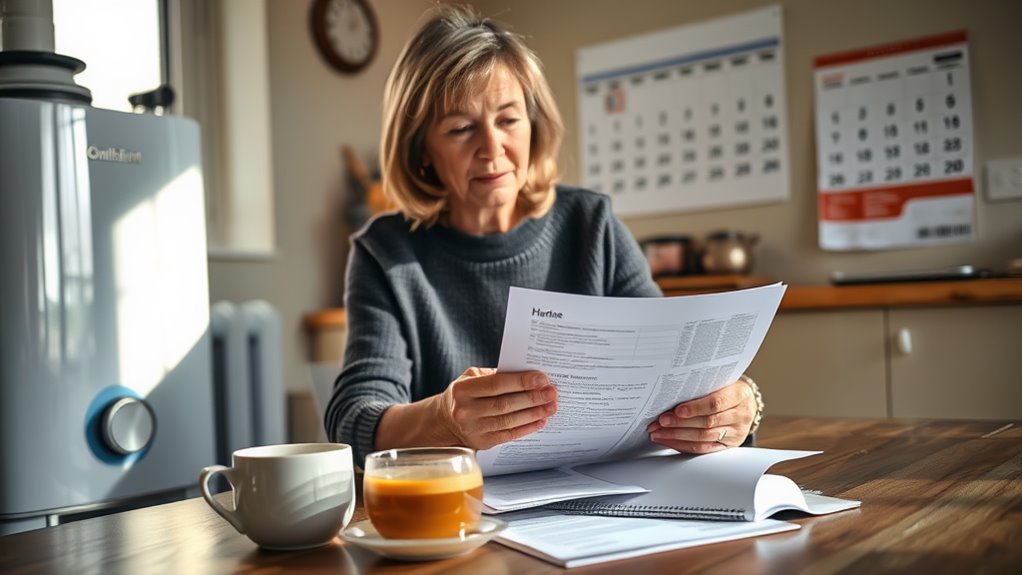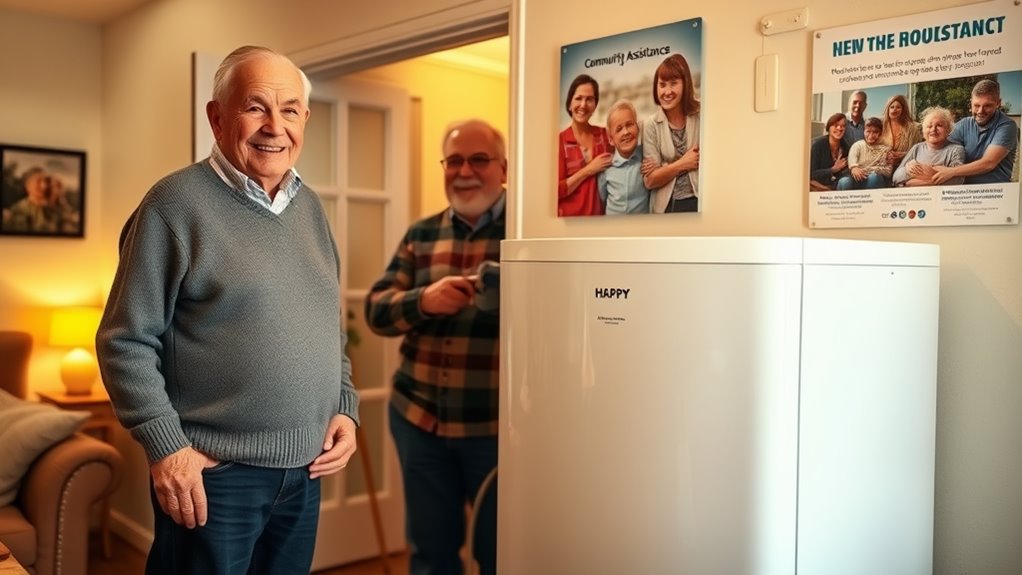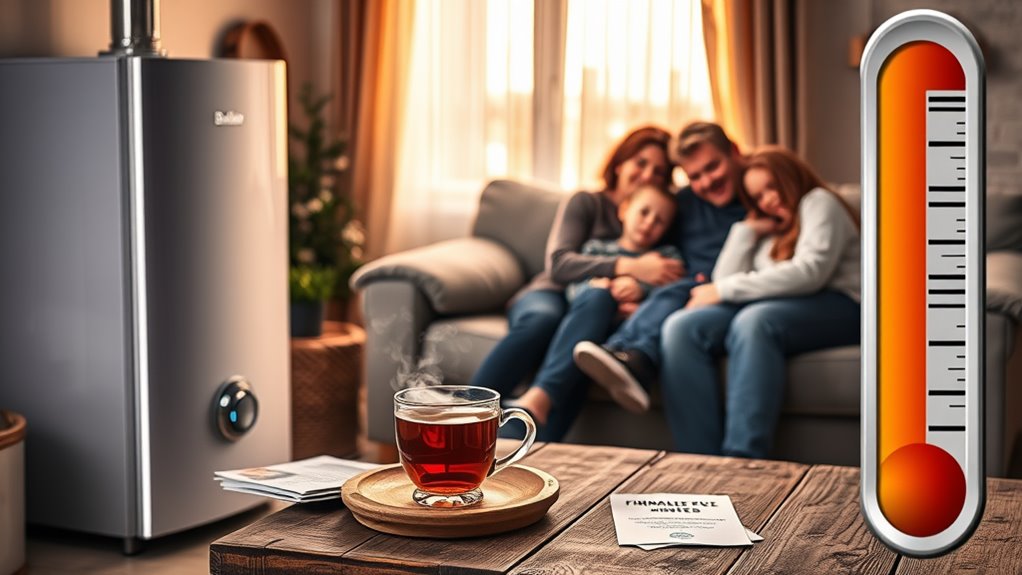To get a free boiler, start by checking government grant schemes in your area, as eligibility often targets low-income households with inefficient systems. Gather necessary documents like proof of income and complete the application accurately. Charitable organizations, such as the Energy Saving Trust, also offer assistance. Additionally, consider other financial support options like rebates or low-interest loans. For more detailed steps and tips, you can explore additional options that could further aid your application process.
Key insights
- Check eligibility for free boiler programs targeting low-income households or specific benefit recipients.
- Research local government and charitable organizations that offer free boiler grants and assistance.
- Gather required documents like proof of income and energy bills for your application.
- Complete the application accurately and keep a record of your application number for follow-up.
- Seek assistance from local authorities or energy providers if you encounter challenges during the application process.
Understanding Government Boiler Grant Schemes

Understanding Government Boiler Grant Schemes can be essential if you're looking to replace your old heating system without breaking the bank. These schemes are designed to help you improve your boiler efficiency while minimizing your upfront costs. By applying for a grant, you can often secure financial support to cover a significant portion of your new boiler installation.
To start, research the available schemes in your area, as they can vary by region. Once you identify a suitable program, you'll need to complete a grant application, providing necessary information about your current heating system and your household's energy needs. Take the time to verify your application is thorough, as this can increase your chances of receiving the grant and upgrading to a more efficient boiler. Additionally, ensure that your new installation meets the necessary Commercial Gas Safety Certificate requirements to guarantee compliance and safety.
Eligibility Criteria for Free Boiler Programs

To qualify for free boiler programs, you must meet specific eligibility criteria that vary by scheme and region. Generally, these programs are aimed at low-income households or individuals receiving certain benefits, like Universal Credit or Pension Credit. You'll also need to have an old boiler that's inefficient or one of the specific boiler types that the program covers. Energy efficiency is a key factor; many programs require your existing boiler to be below a certain energy efficiency rating. It's important to check local regulations and guidelines, as they can differ greatly. By ensuring you meet these criteria, you'll increase your chances of successfully obtaining a free boiler and improving your home's heating efficiency. Additionally, energy-efficient heating systems can significantly lower your utility bills, making it a valuable investment for those who qualify.
Charitable Organizations That Offer Free Boilers

Many people don't realize that several charitable organizations provide free boilers to eligible households. These programs often rely on charitable funding to help you with boiler installation, ensuring you stay warm without breaking the bank. Here are some organizations you might want to explore:
- The Energy Saving Trust: Offers various assistance programs.
- British Gas Energy Trust: Provides grants for heating systems.
- Warm Front: Focuses on improving energy efficiency in homes.
- Salvation Army: May offer support for low-income families.
- Local charities: Check for community-based initiatives.
Connecting with these organizations can lead you to essential support and resources, making your path to a free boiler more accessible. Additionally, some programs emphasize energy efficiency to help reduce long-term heating costs.
How to Apply for a Free Boiler

Applying for a free boiler is straightforward once you know the eligibility criteria. You need to understand what requirements you must meet and the steps involved in the application process. Let's break it down so you can get started and secure your new boiler. Additionally, it's important to ensure that the installation complies with local building regulations to avoid any potential issues.
Eligibility Criteria Explained
While maneuvering the process of securing a free boiler, understanding the eligibility criteria is essential. To qualify, you'll need to meet specific requirements:
- Meet the income requirements set by your local authority or energy provider.
- Be a homeowner or private tenant, usually with confirmed residency.
- Satisfy any age restrictions; often, you must be over 18.
- Have an existing boiler that's broken or inefficient.
- Live in a property that meets energy efficiency standards.
Additionally, consider that installing a new boiler can lead to significant energy savings, which may further support your eligibility for assistance.
Application Process Steps
To secure your free boiler, follow these straightforward steps that can simplify the application process. First, check your eligibility based on the criteria discussed previously. Once you confirm you qualify, gather the required documents, such as proof of income, your energy bills, and details of your current heating system. Next, fill out the application form accurately, ensuring you double-check for any mistakes. Remember to include any additional information that may support your application. After submitting, keep a record of your application number for follow-ups. If you need assistance, don't hesitate to contact your local authority or energy provider for guidance. Additionally, consider the importance of plant room maintenance as it can ensure a safe and efficient heating system in your home. These application tips can help you navigate the process smoothly and increase your chances of approval.
Additional Financial Assistance for Heating Upgrades

When considering heating upgrades, you should explore various financial assistance options available to you. Government grants, energy company incentives, and local charitable programs can greatly reduce your costs. Taking advantage of these resources can make your upgrade more affordable and efficient. Additionally, it's important to ensure that your boiler is functioning properly to avoid issues such as low water pressure that could lead to increased costs.
Government Grants Availability
If you're looking to upgrade your heating system, government grants are available to help ease the financial burden. These programs can greatly reduce your out-of-pocket expenses, making it easier to access a more efficient boiler. To get started with your grant application, consider the following:
- Research available government funding options in your area
- Check eligibility requirements for different programs
- Prepare necessary documents, like income statements and home assessments
- Submit your grant application before the deadline
- Follow up with the funding agency to guarantee your application is processed
Additionally, it's wise to consider regular maintenance to prevent common error codes that could hinder your boiler's performance after installation.
Energy Company Incentives
While exploring ways to finance your new boiler, consider the incentives offered by energy companies. Many of these providers have programs designed to encourage energy efficiency in homes. You might find rebates or discounts specifically for upgrading to a more efficient heating system. These incentives not only reduce your initial costs but can also lead to significant long-term cost savings on your energy bills. Additionally, participating in these programs may help you avoid higher energy costs associated with inefficient heating systems.
Local Charitable Programs
Local charitable programs can be a valuable resource for those needing financial assistance with heating upgrades. Many local charities offer support and can help ease the burden of heating costs. Here are some ways they can assist you:
- Grants for heating system replacements
- No-interest loans for home upgrades
- Emergency funding for urgent repairs
- Assistance with installation fees
- Community workshops on energy efficiency
Reaching out to these organizations not only connects you to financial help, but also fosters community support. They often have the resources and networks to guide you through the process, ensuring you get the assistance you need. Additionally, understanding error codes can further aid in addressing any heating system issues that may arise. Don't hesitate to explore your local charities and see how they can help you achieve a warmer, safer home.
Maintaining Your New Boiler for Longevity
To guarantee your new boiler operates efficiently for years to come, regular maintenance is essential. Start by scheduling an annual inspection with a qualified technician to check for any issues. This professional can provide vital boiler maintenance, ensuring all components function properly.
You should also keep an eye on the pressure gauge; maintaining the right pressure enhances efficiency. Bleed your radiators periodically to remove trapped air, which can improve heat distribution.
Consider installing a smart thermostat to optimize your heating schedule. It's a simple efficiency tip that can save you money while keeping your home comfortable.
Frequently Asked Questions
Can I Get a Free Boiler if I Rent My Home?
If you rent your home, you might still qualify for a free boiler, depending on your boiler eligibility. It's important to check your rental agreements first, as some landlords might have specific clauses regarding upgrades or repairs. If your landlord is open to it, you can explore government schemes that provide funding for energy-efficient boilers, which could benefit both you and your landlord in the long run. Always communicate openly about your options.
How Long Does the Application Process Take?
The application timeline for securing assistance can vary, but you can generally expect the processing duration to take anywhere from a few weeks to a couple of months. Factors like your location, the demand for services, and the completeness of your application can influence this timeline. To speed things up, make sure you submit all required documents promptly and follow up with the relevant agency if you haven't heard back within a reasonable timeframe.
Are There Specific Brands of Boilers Provided for Free?
When exploring free options for boilers, you'll find that brand availability can vary based on your location and the specific program you're applying to. Some programs may offer well-known brands, while others might focus on lesser-known manufacturers. It's crucial to research and ask about the brands included in your local initiatives. This way, you can make certain you're getting a reliable product that meets your heating needs without breaking the bank.
What Happens if My Boiler Breaks Down After Installation?
If your boiler breaks down after installation, it can be frustrating. You'll want to check your warranty first, as it often covers repair costs. Regular boiler maintenance can help prevent breakdowns, so consider scheduling annual check-ups. If you do face issues, getting a qualified technician to assess the problem quickly is essential. They'll provide you with options for repair or replacement, ensuring your home stays warm and comfortable.
Can I Upgrade My Free Boiler to a More Efficient Model?
Yes, you can often upgrade your free boiler to a more efficient model, but it depends on the program you participated in. Check your upgrade options with your provider, as some may offer incentives for higher efficiency boilers. Improving boiler efficiency can save you money on energy bills, so it's worth exploring. Just make sure you understand any associated costs or requirements before making your decision. You've got options!
Summary
In summary, getting a free boiler is within reach if you know where to look. By exploring government grant schemes, checking eligibility, and considering charitable organizations, you can find the support you need. Don't forget to maintain your new boiler for peak performance. With the right information and a little effort, you can guarantee your home stays warm without breaking the bank. Take the first step today and start your journey to a more energy-efficient home.

